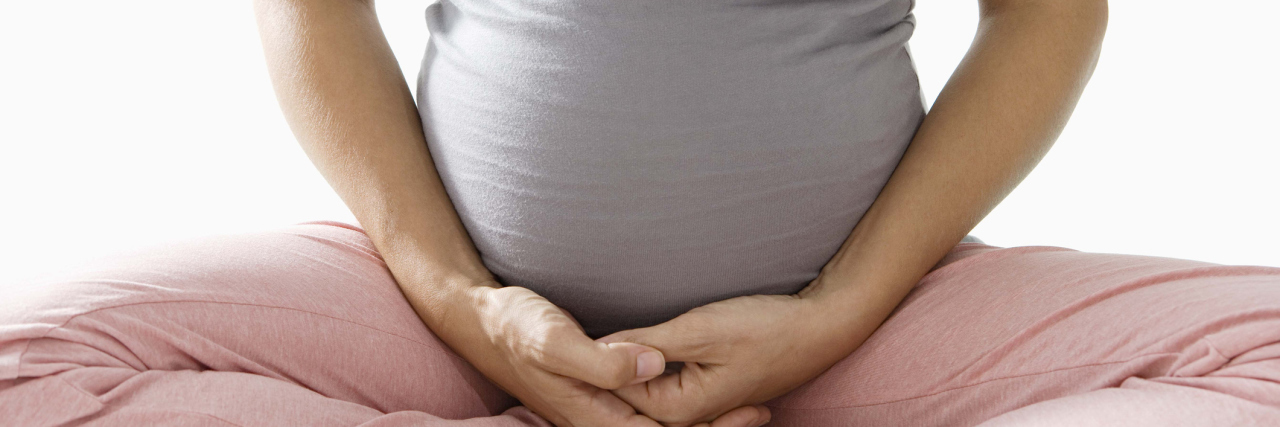5 Things I Want Pregnant Women in Eating Disorder Recovery to Know
I struggled with anorexia from the time I was 10 until I was in my mid-20s. I had a hate-hate relationship with my body that made romantic relationships incredibly challenging. Even the idea of having children — allowing my body to blow up and house another human inside me — repulsed me. In fact, to this day, it still surprises me that I have two healthy sons.
Before getting pregnant with my first child at 31, I did a lot of hard thinking. Would I be able to deal with seeing the scale rise, week after week, without wanting to harm myself? Would I be able to manage the hunger pains that come with feeding a second human being, without becoming addicted to them? Would I be willing to actually feed those pains with nourishing food to keep my baby safe and healthy? For me, the answer was yes — but that doesn’t mean it was easy.
What I found during my pregnancies is that there weren’t a lot of support groups focused on helping pregnant women struggling with anorexia carry a full-term baby healthfully. That seemed absurd to me, because even the healthiest women deal with “feeling fat” and “unwanted” as they see their bodies change throughout the process. To help those currently struggling with managing their anorexic feelings — or habits — as they consider having children, I want to share five things I learned on my own personal journey.
1. Pregnancy — and motherhood — can give your curves greater purpose.
The greatest gift my son gave me is the ability to love my body again. In fact, after having children, I finally understood the curves of my body for the very first time. I understood that my baby loved my softness. He loved cozying into my chest, against my tummy, and later on, against my backside while standing in line or relaxing at home. Having children helped my body make sense. That, in itself, was worth the experience of pregnancy.
2. It’s OK to ask for affirmation — and accept it.
You may not feel beautiful during pregnancy. You may not feel sexy, either. Ask your partner to tell you you’re beautiful — and to make you feel beautiful — so you realize you are still the same gorgeous, loved person inside, no matter how much your body is changing. And, believe your partner when they tell you!
3. Motherhood can make you forget your personal challenges.
I’m not saying all of your issues in life will vanish once you have a child. But what I can say is that there is far less time to worry and wallow in our own problems when we have a baby to care for — a baby who needs us to be strong, well and available at any moment. In that sense, motherhood can sometimes dissolve much of the noise that fueled anorexia in the first place.
4. Have realistic expectations.
No one’s tummy is flat the day — or week — or month — after delivering a child. I know it’s scary to gain weight, especially the amount of weight gain that being pregnant can cause. But nature has numerous fail safe ways to help moms lose weight safely once our babies are born. Allow your body to adjust naturally over time. It’s possible your body will settle into a new “natural weight,” and that is OK.
5. You don’t have to pretend you’re fine.
Pregnancy can be hard, even for those of us who don’t battle with mental disorders. If you’re struggling, your doctors want to know about it. What’s more, if you have a partner, they will want to know about it, too. Your entire care team wants you to have a healthy baby — but your health is equally important. Do not be afraid to tell your doctors if you need counseling, medication, or other resources to make it through the experience happy and well.
Being pregnant is not easy. Being pregnant as a current or recovered anorexic can be even harder. But it can be done healthfully — for the benefit of both you and your beautiful child.
Follow this journey here.
If you or someone you know is struggling with an eating disorder, you can call the National Eating Disorders Association Helpline at 1-800-931-2237.
We want to hear your story. Become a Mighty contributor here.
Thinkstock photo via Jupiterimages

